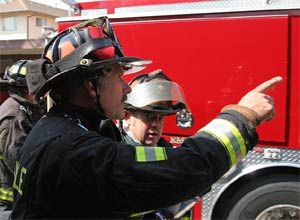 Photo Craig Allyn Rose/EmergencyPhoto.com |
| Related Article: The Kitchen Table: Food for thought about leadership |
All your preparation, experience and hard work have paid off, and you’ve become a company officer. Congratulations! Now what? Beyond being in charge at emergency scenes, what do you really need to do now to increase your competence, confidence and credibility in the new role? Consider the following:
1. Train Assertively and Fearlessly. Just because you’re an officer now doesn’t mean you know everything. Quite the contrary. You are in a new role, even when dealing with familiar situations. Allow yourself to be a beginner again. Seek out training both individually and as a member of your crew. Use training as an opportunity to really learn something, not as a way of showing off. In other words, don’t be afraid to make mistakes or admit that you don’t know something.
2. Develop Conflict Resolution Skills. Don’t think you are naturally good at this. Few people are. You will need these skills, and probably sooner than you think. So prepare yourself. Take classes. Read articles and books on the subject. Talk through situations with others. Learn how to confront problems early. Your ability to function as a member and a leader of a team depends on these skills.
3. Learn About Political Realities. This knowledge applies not only to your own organization, but also to the governing jurisdiction you serve. What are the budget constraints currently facing your department? What organizational pressures do your supervisors and departmental leaders face? What is the history of relations between your department and other agencies you work with on a regular basis? A company officer does not exist in a vacuum, but rather as a part of the greater whole.
4. Know Your Equipment and District Better than Your Crew Does. Okay, if your driver is a diesel mechanic, or your firefighter is a paramedic and you’re not, maybe there will be some exceptions to this rule. But in general, you need to maintain the knowledge base you worked hard to develop as a firefighter regarding equipment on the rig. Don’t allow yourself to get complacent in this area just because you have other new responsibilities that are putting demands on your time. Make it a habit to pull out some piece of equipment nearly every shift, just to look at it. As for your district, get out and see it. Get off the rig and walk around. Knowledge gained from the experience of being there will be retained much better than what is learned from studying maps alone.
5. Set Clear Expectations. This applies to the emergency scene, but especially to the vast majority of the time you spend not responding to calls. What do you want your firefighter to do first at a car fire? Where should the driver plan to position the rig at a vehicle accident? When will housecleaning be done, and who does what? Will firefighters be able to work out during their shift, and if so, when? What forms of address should people use, both off and on the emergency scene? What about use of computers and phones on duty? There will always be exceptions, but setting clear expectations in a general sense will go a long way to prevent problems and misunderstandings.
6. Lead By Example. If you sit around in sweats doing e-mail on the computer for three hours every morning, you’re sending a clear message to your crew about what is acceptable for them as well. Be the firefighter you want to work with. Be generous with praise and share credit for accomplishments. Be honest about your own mistakes. Demonstrate appreciation for being part of the team.
7. Write Carefully. Many firefighters lack confidence and skill in writing. Just because you are now an officer, you did not magically acquire those abilities. As an officer, what you write really matters. Get the help you need to write well and understand the consequences of not attending to this important skill.
8. Have a Career Plan. It has been said that luck is the result of opportunity and preparation. So be prepared. Look at the big picture even if you think now that you will always want to stay right where you are. Make yourself indispensable in the organization. Try new things. Keep your certifications current and seek out new ones.
9. Remember Where You Came From. Treat others, and especially your crew, with respect. Do not try to lead through fear or intimidation. Don’t overreact to mistakes. Be a mentor and look for ways others can mentor you. Make it a goal to make your crew feel safe, no matter what they are doing.
10. Relax. Enjoy your new role. Anxiety and fear lead to bad decision making. Know and accept yourself as you are with your own unique strengths and weaknesses. Work toward continual improvement of yourself and your team. And never forget to sit back at times, appreciate where you are, and say “Good job!” to your crew, and to yourself.












